- C Programming Examples
- C Programming Examples
- C Print Hello World
- C Get Input from User
- C Print Integer
- C Add Two Numbers
- C Add Subtract Multiply Divide
- C Add n Numbers
- C Area Perimeter of Square
- C Area Perimeter of Rectangle
- C Area Circum of Circle
- C Fahrenheit to Celsius
- C Celsius to Fahrenheit
- C Inches to Centimeters
- C Kilogram to Gram
- C Reverse a Number
- C Swap Two Numbers
- C Interchange Numbers
- C Print ASCII Value
- C Print Fibonacci Series
- C Check Palindrome or Not
- C Check Armstrong or Not
- C Find Armstrong Numbers
- C Find nCr and nPr
- C Find Profit Loss
- C Sum of their Square
- C First & Last Digit Sum
- C Sum of All Digit
- C Product of All Digit
- C Print Total Digit in Number
- C Check Perfect Number
- C Find Basic Gross Salary
- C Round Number to Integer
- C Print Series upto n Term
- C Find Factors of Number
- C if-else & Loop Programs
- C Check Even or Odd
- C Check Prime or Not
- C Check Alphabet or Not
- C Check Vowel or Not
- C Check Leap Year or Not
- C Is Reverse Equal Original
- C Make Calculator
- C Add Digits of Number
- Count Positive Negative Zero
- C Largest of Two Numbers
- C Largest of Three Numbers
- C Smallest of Two Numbers
- C Smallest of Three Numbers
- C Find Factorial of Number
- C Find LCM & HCF
- C Find LCM of n Numbers
- C Find HCF of n Numbers
- C Find Arithmetic Mean
- C Find Average, Percentage
- C Find Student Grade
- C Print Table of Number
- C Print Prime Numbers
- C Find Discount Purchase
- C Calculate Parcel Charge
- C Calculate Wage of Labor
- C Print Phone Bill
- C Conversion programs
- C Decimal to Binary
- C Decimal to Octal
- C Decimal to Hexadecimal
- C Binary to Decimal
- C Binary to Octal
- C Binary to Hexadecimal
- C Octal to Decimal
- C Octal to Binary
- C Octal to Hexadecimal
- C Hexadecimal to Decimal
- C Hexadecimal to Binary
- C Hexadecimal to Octal
- C Pattern Programs
- C Pattern Printing Programs
- C Print Diamond Pattern
- C Print Floyd's Triangle
- C Print Pascal's Triangle
- C Array Programs
- C 1D Array Programs
- C Linear Search
- C Binary Search
- C Largest Element in Array
- C Smallest Element in Array
- C Second Largest/Smallest
- C Count Even Odd
- C Array Element at Even
- C Array Element at Odd
- C Print Even Array Elements
- C Print Odd Array Elements
- C Sum/Product of Even/Odd
- C Reverse an Array
- C Insert Element in Array
- C Delete Element from Array
- C Merge Two Arrays
- C Bubble Sort
- C Selection Sort
- C Insertion Sort
- C Print Common Elements
- C 2D Array Programs
- C Add Two Matrices
- C Subtract Two Matrices
- C Transpose a Matrix
- C Multiply Two Matrices
- C Sum All Matrix Elements
- C Largest Element in Matrix
- C Print Row Column Total
- C 3D Array Programs
- C String Programs
- C Print String
- C Find Length of String
- C Compare Two String
- C Copy a String
- C Concatenate String
- C Reverse a String
- C Count Vowels Consonants
- C Replace Vowel in String
- C Delete Vowels from String
- C Delete Word from String
- C Frequency of Character
- C Count Word in String
- C Remove Spaces from String
- C Sort a String
- C Sort String in Alphabetical
- C Sort Words in Ascending
- C Sort Words in Descending
- C Uppercase to Lowercase
- C Lowercase to Uppercase
- C Swap Two Strings
- C Check Anagram or Not
- C Check Palindrome String
- C Print Number in Words
- C Print Successive Character
- C Character without Space
- C File Programs
- C Read a File
- C Write Content to File
- C Read & Display File
- C Copy a File
- C Merge Two Files
- C Reverse File
- C Count All Character in File
- C List Files in Directory
- C Encrypt & Decrypt a File
- C Delete a File
- C Misc Programs
- Generate Random Numbers
- C Print Date Time
- C Print Message with Time
- C Get IP Address
- C Print Smiling face
- C Pass Array to Function
- Add Two Numbers using Pointer
- C Address of Variable
- C Shutdown Computer
- C Programming Tutorial
- C Tutorial
C program to check if a given string is a palindrome
In this article, you will learn how to check whether a given string is a palindrome or not. Here is the list of programs available here:
- Simple C program to check if a given string is a palindrome.
- Check if a given string is a palindrome without using the string function.
- Check if a given string is a palindrome using the user-defined function.
But before going through these programs, let's talk about the meaning of a palindrome string.
What is a palindrome string?
Palindromes are strings in which all of the opposite characters are the same. And if any of the opposite characters mismatch, then the string is not a palindrome. For example:
- codoc is a palindrome string because:
- The first character (c) is equal to the last character (c).
- The second character (o) is the same as the second-last character (o).
- The third character (d) is equal to the third character from the last (d).
- codssdoc is also a palindrome string because:
- The first character (c) is equal to the last character (c).
- The second character (o) is equal to the second-last character (o).
- The third character (d) is equal to the third-last character (d).
- The fourth character (s) is equal to the fourth-last character (s).
In other words, you can say that if the reverse of a string is equal to its original, then that string can be called a palindrome string.
Palindrome String Program in C
The question is: write a program in C to enter any string at run-time and check whether it is a palindrome or not. The answer to this question is:
#include<stdio.h> #include<conio.h> #include<string.h> int main() { char str[50]; int i, j, len, chk=0; printf("Enter any String (word): "); scanf("%s", str); len = strlen(str); for(i=0, j=(len-1); i<=(len-1); i++, j--) { if(str[i] != str[j]) { chk=1; break; } } if(chk==1) printf("\nIt's not a Palindrome String"); else printf("\nIt's a Palindrome String"); getch(); return 0; }
The above program is written in the CodeBlocks IDE. Here is the output after building and running. This is the first screenshot of the first sample run:
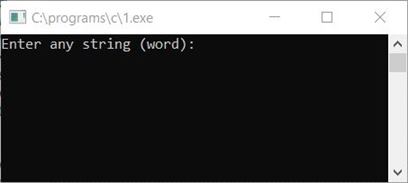
And here is the second screenshot of the first sample run:
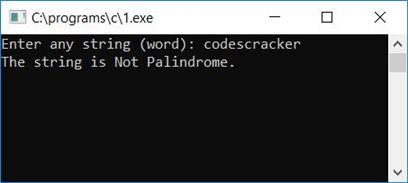
As the reverse of codescracker is rekcarcsedoc, which is not equal to the original string, that is codescracker, therefore the string is not a palindrome.
Here is the first screenshot of the second sample run:
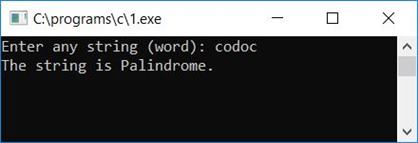
Here in this case, the reverse of codoc is codoc, which is the same as the original string, that is, codoc, therefore, the string is a palindrome.
Program Explained
- First, we have to count the length of the string using the strlen() function. For example, let's suppose the length of the string is 6.
- Create a loop to compare the first character of the string to the last, and then the second to the second last, and so on. Therefore, the first character is compared to the sixth character, the second to the fifth, and the third to the fourth. Because indexing begins at 0, we must subtract one from all. That is, 0th to length-1.
- If any of the above comparisons go wrong, or if any character mismatches, then we have to initialize any number, say 1, to any character, say chk, and skip the remaining code of the loop using the break statement.
- After exiting from the loop, whether using a break statement or after running the whole loop, We have to check whether the variable chk holds its original value, that is, 0 or not. If it holds its original value, then none of the opposite characters mismatch (meaning it is a palindrome), and if it doesn't hold its original value, then any of the opposite characters mismatch (meaning it is not a palindrome).
- The string is not a palindrome if there is a mismatch; otherwise, the string is a palindrome.
Here is another sample run for a palindrome string:
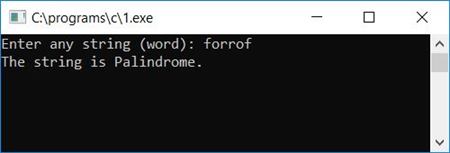
And here is one more sample run, not a palindrome string:
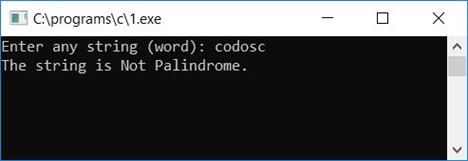
Check palindrome strings in C without using the string function
Here is another program that will not use any string functions. As you can see from the previous program, the string function strlen() is used to find the length of the entered string. But here, this program will calculate the length of a string without using any library functions.
#include<stdio.h> #include<conio.h> int main() { char str[50]; int i, j, len, chk=0; printf("Enter any String (word): "); scanf("%s", str); len = 0; while(str[len]!='\0') len++; for(i=0, j=(len-1); i<=(len-1); i++, j--) { if(str[i] != str[j]) { chk=1; break; } } if(chk==1) printf("\nIt's not a Palindrome String"); else printf("\nIt's a Palindrome String"); getch(); return 0; }
The code:
len=0; while(str[len]!='\0') len++;
is used to find the length of a string. For example, if the user enters codes as input, 0 is initialized to len before entering the while loop. The '\0' is known as a null terminated character. At the end of every string, a null-terminated character gets automatically initialized. So the dry run of the above code works like this:
- For the first run, str[len] or str[0] or c is not equal to '\0'. Therefore, len++ gets executed, so the value of len gets incremented and becomes 1.
- For the second run, str[len] or str[1] or o is not equal to '\0'. Therefore, len++ gets executed, so the value of len gets incremented and becomes 2.
- For the third run, str[len] or str[2] or d is not equal to '\0'. Therefore, len++ gets executed, so the value of len gets incremented and becomes 3.
- For the sixth run, str[len] or str[5] or '\0' is equal to '\0'. Therefore, the condition evaluates to be false, so the loop gets terminated, and we have a variable, len, that holds the length value of the string.
Check palindrome strings in C using the function
This is the last program to check whether a given string is a palindrome or not using a user-defined function.
#include<stdio.h> #include<conio.h> int checkPalindromeStr(char []); int main() { char str[50]; int chk; printf("Enter any String (word): "); scanf("%s", str); chk = checkPalindromeStr(str); if(chk==1) printf("\nIt's not a Palindrome String"); else printf("\nIt's a Palindrome String"); getch(); return 0; } int checkPalindromeStr(char str[]) { int i, j, len; len = 0; while(str[len]!='\0') len++; for(i=0, j=(len-1); i<=(len-1); i++, j--) { if(str[i] != str[j]) return 1; } return 0; }
This program will produce the same output as the first program given earlier in this article.
« Previous Program Next Program »